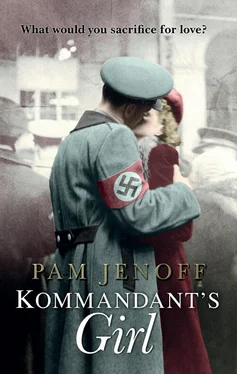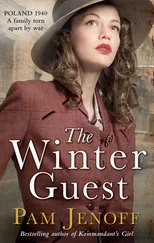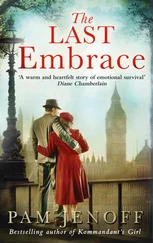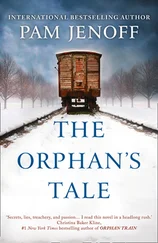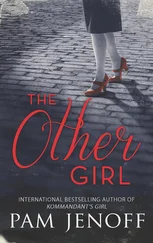I met Jacob eighteen months ago while I was working as a clerk in the university library. It was a Friday afternoon, I remember, because I was rushing to update the book catalog and get home in time for Shabbes. “Excuse me,” a deep voice said. I looked up from my work, annoyed at the interruption. The speaker was of medium height and wore a small yarmulke and closely trimmed beard and mustache. His hair was brown with flecks of red. “Can you recommend a good book?”
“A good book?” I was caught off guard as much by the swimming darkness of his eyes as by the generic nature of his request.
“Yes, I would like something light to read over the weekend to take my mind off my studies. Perhaps the Iliad …?”
I could not help laughing. “You consider Homer light reading?”
“Relative to physics texts, yes.” The corners of his eyes crinkled. I led him to the literature section, where he settled upon a volume of Shakespeare’s comedies. Our knuckles brushed as I handed him the book, sending a chill down my spine. I checked out the book to him, but still he lingered. I learned that his name was Jacob and that he was twenty, two years my senior.
After that, he came to visit me daily. I quickly learned that even though he was a science major, his real passion was politics and that he was involved with many activist groups. He wrote pieces, published in student and local newspapers, that were critical not only of the Polish government, but of what he called “Germany’s unfettered dominance” over its neighbors. I worried that it was dangerous to be so outspoken. While the Jews of my neighborhood argued heatedly on their front stoops, outside the synagogues and in the stores about current affairs and everything else, I was raised to believe that it was safer to keep one’s voice low when dealing with the outside world. But Jacob, the son of prominent sociologist Maximillian Bau, had no such concerns, and as I listened to him speak, watched his eyes burn and his hands fly, I forgot to be afraid.
I was amazed that a student from a wealthy, secular family would be interested in me, the daughter of a poor Orthodox baker, but if he noticed the difference in our backgrounds, it did not seem to matter. We began spending our Sunday afternoons together, talking and strolling along the Wisla River. “I should be getting home,” I remarked one Sunday afternoon in April as the sky grew dusky. Jacob and I had been walking along the river path where it wound around the base of Wawel Castle, talking so intensely I had lost track of time. “My parents will be wondering where I am.”
“Yes, I should meet them soon,” he replied matter-of-factly. I stopped in my tracks. “That’s what one does, isn’t it, when one wants to ask permission to court?” I was too surprised to answer. Though Jacob and I had spent much time together these recent months and I knew he enjoyed my company, I somehow never thought that he would seek permission to see me formally. He reached down and took my chin in his gloved fingers. Softly, he pressed his lips down on mine for the first time. Our mouths lingered together, lips slightly parted. The ground seemed to slide sideways, and I felt so dizzy I was afraid that I might faint.
Thinking now of Jacob’s kiss, I feel my legs grow warm. Stop it, I tell myself, but it is no use. It has been nearly six months since I have seen my husband, been touched by him. My whole body aches with longing.
A sharp clicking noise jars me from my thoughts. My vision clears and I find myself still standing in front of the yellow house, staring upward. The front door opens and an older, well-dressed woman steps out. Noticing me and Lukasz, she hesitates. I can tell she is wondering who we are, why we have stopped in front of her house. Then she turns from us dismissively, locks the door and proceeds down the steps. This is her home now. Enough, I tell myself sharply. I cannot afford to do anything that will draw attention. I shake my head, trying to clear the image of Jacob from my mind.
“Come, Lukasz,” I say aloud, tugging gently on the child’s hand. We continue walking and soon cross the Planty, the broad swath of parkland that rings the city center. The trees are revealing the most premature of buds, which will surely be cut down by a late frost. Lukasz tightens his grip on my hand, staring wide-eyed at the few squirrels that play among the bushes as though it is already spring. As we push onward, I feel the city skyline receding behind us. Five minutes later we reach the Aleje, the wide boulevard that, if taken to the left, leads south across the river. I stop and look toward the bridge. Just on the other side, a half kilometer south, lies the ghetto. I start to turn in that direction, thinking of my parents. Perhaps if I go to the wall, I can see them, find a way to slip them some of the food I have just purchased. Krysia would not mind. Then I stop—I cannot risk it, not in broad daylight, not with the child. I feel shame at my stomach, which no longer twists with hunger, and at my freedom, at crossing the street as though the occupation and the war do not exist.
Half an hour later, Lukasz and I reach Chelmska, the rural neighborhood we have come to call home. My feet are sore from walking along the uneven dirt road and my arms ache from carrying the groceries, as well as the child, for the last several meters. As we round the corner where the main road divides in two, I inhale deeply; the air has grown colder now, its pureness broken only by an acrid hint of smoke from a farmer burning piles of dead winter brush. I can see the fires smoldering across the sloping farmland to my right, their thick smoke fanning out over the fields that roll like a gentle green lake into the horizon.
We turn left onto the road dotted with farmhouses that, if taken farther, winds upward into the tree-covered hills of Las Wolski. About fifty yards up the road stands Krysia’s house, a dark wood, three-story chalet, nestled among the pine trees. A plume of smoke rises from the chimney to greet us. I set the child down and he runs ahead. Hearing his footsteps, Krysia appears from behind the house and walks to the front gate. With her silver hair piled high on her head, she looks as though she is attending the opera, except that her hands are clad in cracked leather gardening gloves, rather than silk or lace. The hem of her working dress, nicer than anything I could ever hope to own, is caked with dirt. At the sight of Lukasz, her lineless face folds into a smile. She breaks her perfect posture to stoop and lift him.
“Did everything go all right?” Krysia asks as I approach, still bouncing Lukasz on her hip and studying his face. She does not look at me. I am not offended by her preoccupation with the child. In the time he has been with us, he has yet to smile or speak, a fact that is a source of constant worry for both of us.
“More or less.”
“Oh?” Her head snaps up. “What happened?”
I hesitate, not wanting to speak in front of the child. “We saw some, um, Germans.” I tilt my head in Lukasz’s direction. “And it was upsetting. But they didn’t notice us.”
“Good. Were you able to get everything at market?”
I shake my head. “Some things.” I lift the basket slightly. “Not as much as I hoped, though.”
“It’s no matter, we’ll manage. I was just turning over the ground in the garden so that we can seed next month.” Wordlessly, I follow Krysia into the house, amazed as ever at her grace and strength. There is a sense of purpose in the way she shifts her weight as she walks that reminds me of my husband.
Upstairs, Krysia takes the basket from me and begins to unpack the groceries. I wander into the parlor. After two weeks of living here, I am still awestruck by the plush furniture, the beautiful artwork that adorns every wall. I walk past the grand piano to the fireplace. On the mantel sit three framed photographs. One is of Marcin, Krysia’s deceased husband, seated with his cello in front of him, wearing a tuxedo. Another is of Jacob as a child playing by a lake. I lift the third picture. It is a photograph of Jacob and me, taken on our wedding day. We are standing on the steps in front of the Baus’ house on Grodzka Street, Jacob in a dark suit, me in the ankle-length white linen wedding dress that had been worn by my mother and grandmother before me. Though we were supposed to be looking at the camera, our heads are tilted toward each other, my lips parted with laughter at a joke he had just whispered to me.
Читать дальше
